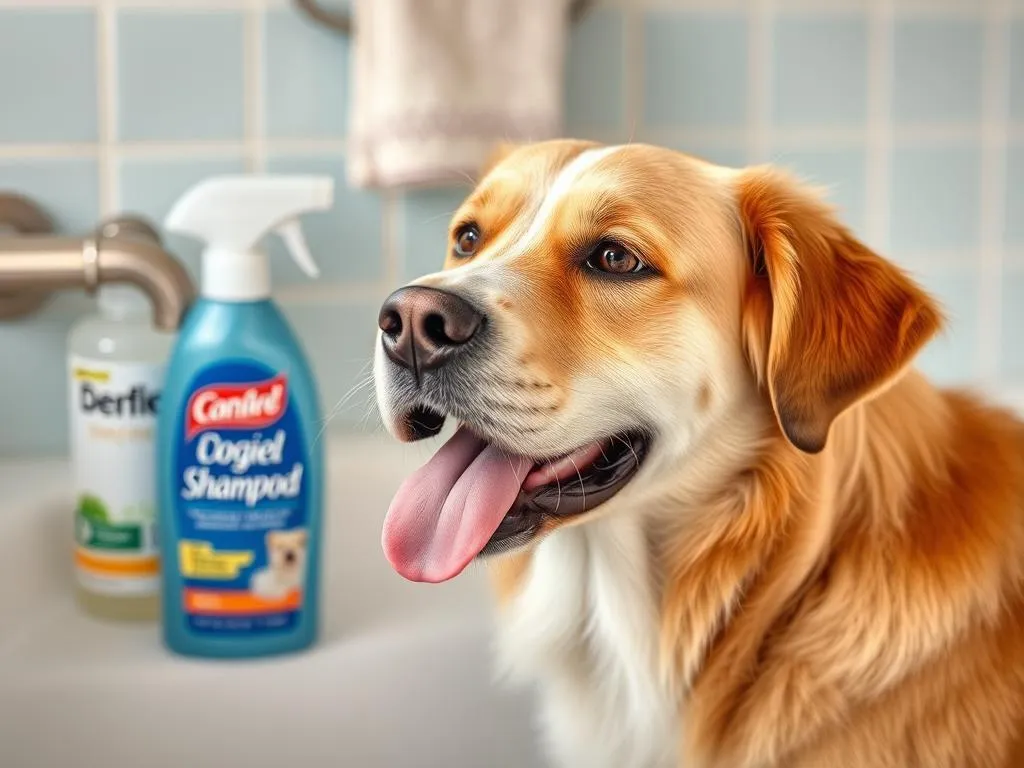
Introduction
Dog health care is crucial for the well-being of our furry friends, especially when it comes to managing allergies. Many dogs suffer from allergies, which can manifest in various symptoms that affect their quality of life. These allergies can be triggered by food, environmental factors, or contact with certain substances. One effective way to help alleviate the discomfort caused by these allergies is through the use of specialized shampoos. Choosing the best dog shampoos for allergy sufferers can significantly improve your dog’s skin condition and overall comfort.
Understanding Dog Allergies
What Are Dog Allergies?
Allergies in dogs occur when their immune system reacts excessively to certain substances, known as allergens. This reaction can lead to various health issues, including skin irritations and gastrointestinal problems. There are three primary types of allergies that dogs may experience:
- Food Allergies: These occur when a dog’s immune system reacts to specific ingredients in their diet, such as proteins, grains, or additives.
- Environmental Allergies: Commonly known as atopy, these allergies are triggered by substances in the environment, such as pollen, dust mites, or mold.
- Contact Allergies: These happen when a dog comes into direct contact with an allergen, such as specific fabrics, chemicals, or certain plants.
Common Symptoms of Allergies in Dogs
Recognizing the symptoms of allergies is essential for timely treatment. Here are some common signs that your dog may be suffering from allergies:
- Itching and Scratching: Dogs may scratch excessively, leading to skin irritation and possible infections.
- Red or Inflamed Skin: Allergies can cause noticeable redness and inflammation, particularly in sensitive areas.
- Hot Spots and Skin Infections: These painful and itchy patches can develop due to constant licking or scratching.
- Ear Infections and Excessive Licking: Frequent ear infections and constant licking of paws or skin are common signs of allergic reactions.
Causes of Allergies in Dogs
Several factors can contribute to allergies in dogs:
- Genetic Predisposition: Some breeds are genetically more prone to allergies, making it essential to be aware of your dog’s breed tendencies.
- Environmental Factors: Seasonal changes and exposure to allergens like pollen or dust can trigger allergic reactions.
- Food Ingredients and Additives: Certain ingredients in commercial dog food can provoke allergic responses, making it vital to choose the right diet.
Importance of Choosing the Right Shampoo
How Shampoos Affect Dog Health
The role of shampoos in canine health care is significant, especially for dogs with allergies. Shampoos not only help in cleaning the fur but also play a crucial role in maintaining skin health. The pH balance of a dog’s skin differs from that of humans, and using the wrong shampoo can lead to further irritation.
Ingredients to Look For
When selecting a shampoo for dogs with allergies, consider these beneficial ingredients:
- Hypoallergenic Ingredients: Formulations designed for sensitive skin can reduce the risk of triggering allergic reactions.
- Natural and Organic Components: Ingredients sourced from nature tend to be gentler and less likely to cause irritation.
- Soothing Agents: Ingredients such as oatmeal and aloe vera can soothe inflamed skin and provide relief from itching.
Ingredients to Avoid
Avoid shampoos with the following harsh ingredients that can exacerbate allergy symptoms:
- Harsh Chemicals and Sulfates: These can strip natural oils and irritate the skin.
- Fragrances and Artificial Colors: Synthetic additives can trigger allergic reactions and should be avoided.
- Parabens and Phthalates: These preservatives may cause skin irritation and should not be included in dog shampoos.
Top 10 Best Dog Shampoos for Allergy Sufferers
Criteria for Selection
When compiling a list of the best dog shampoos for allergy sufferers, several factors were considered:
- Hypoallergenic Formulations: Products that minimize the risk of allergic reactions.
- Customer Reviews and Ratings: Feedback from dog owners provides insight into product effectiveness.
- Veterinary Recommendations: Endorsements from veterinarians lend credibility to product claims.
Product Reviews
- Shampoo 1: Vet’s Best Allergy Itch Relief Shampoo
- Key Features and Benefits: Contains aloe vera and vitamin E to soothe irritated skin and reduce itching.
- Pros and Cons: Effective for many dogs; some users report it may require frequent application.
-
Price Range: $10-$15.
-
Shampoo 2: Earthbath Oatmeal & Aloe Dog Shampoo
- Key Features and Benefits: Natural colloidal oatmeal and aloe soothe and moisturize dry skin.
- Pros and Cons: Gentle formula; may not be suitable for heavy-duty cleaning.
-
Price Range: $14-$20.
-
Shampoo 3: Pawsitively Posh Dog Shampoo
- Key Features and Benefits: Hypoallergenic formulation with no artificial fragrances or colors, perfect for sensitive skin.
- Pros and Cons: Non-irritating; some dogs may not like the scent.
-
Price Range: $12-$18.
-
Shampoo 4: TropiClean Oatmeal & Coconut Pet Shampoo
- Key Features and Benefits: Natural oatmeal and coconut help to moisturize and relieve itching.
- Pros and Cons: Great for dogs with sensitive skin; lathers well but may require thorough rinsing.
-
Price Range: $10-$15.
-
Shampoo 5: Burt’s Bees for Dogs Natural Shampoo
- Key Features and Benefits: Made with natural ingredients like honey and beeswax, this shampoo is gentle and effective.
- Pros and Cons: Eco-friendly; may not be as effective for severe skin conditions.
-
Price Range: $8-$12.
-
Shampoo 6: Zymox Enzymatic Shampoo
- Key Features and Benefits: Features enzymes that help with skin infections and provide relief from itching.
- Pros and Cons: Highly effective for skin issues; may be pricier than other options.
-
Price Range: $15-$25.
-
Shampoo 7: PetPleasant Lavender Pet Shampoo
- Key Features and Benefits: Infused with lavender for a calming effect; hypoallergenic and gentle.
- Pros and Cons: Pleasant scent; may not clean heavily soiled dogs effectively.
-
Price Range: $10-$16.
-
Shampoo 8: Nature’s Miracle Oatmeal Shampoo
- Key Features and Benefits: Soothes dry skin and controls odors with a gentle oatmeal formula.
- Pros and Cons: Affordable and effective; some users report it may not lather well.
-
Price Range: $8-$12.
-
Shampoo 9: Vet’s Best Hypo-Allergenic Dog Shampoo
- Key Features and Benefits: Formulated specifically for sensitive skin, with no harsh chemicals.
- Pros and Cons: Excellent for allergy-prone dogs; may not provide deep cleaning.
-
Price Range: $10-$14.
-
Shampoo 10: Rocco & Roxie Dog Shampoo
- Key Features and Benefits: Organic ingredients and soothing properties make it ideal for sensitive skin.
- Pros and Cons: Gentle and effective; slightly more expensive.
- Price Range: $18-$24.
How to Bathe Your Dog with Allergy Issues
Preparing for the Bath
Before starting the bathing process, it’s essential to gather all necessary supplies, including:
- Hypoallergenic dog shampoo
- Towels
- A non-slip mat for safety
- A brush for pre-bath grooming
Creating a comfortable bathing environment can help ease your dog’s anxiety. Use lukewarm water and ensure the area is free from drafts.
Step-by-Step Bathing Guide
- Wetting the Dog Properly: Start by wetting your dog thoroughly with lukewarm water. Avoid spraying directly in their face to minimize stress.
- Applying Shampoo and Massaging It In: Apply a generous amount of your chosen hypoallergenic shampoo and gently massage it into the coat, focusing on areas that may be irritated. This will help to clean the skin and distribute soothing ingredients.
- Rinsing Thoroughly: Rinse your dog thoroughly to remove all shampoo residue, as leftover product can cause irritation.
Post-Bath Care
After bathing, dry your dog with a towel or a pet dryer on a low setting to prevent chills. Consider using a moisturizing spray or conditioner specifically designed for dogs to help soothe the skin further.
Additional Tips for Managing Dog Allergies
Regular Grooming
Regular grooming is vital for dogs with allergies. It helps to remove allergens from the fur and skin, reducing the likelihood of irritation. Brushing your dog’s coat regularly can also distribute natural oils and keep the skin healthy.
Diet Considerations
The role of diet in managing allergies cannot be underestimated. Consult your veterinarian for recommendations on hypoallergenic dog food that may help alleviate food-related allergens.
Environmental Management
Reducing allergens in your dog’s environment is crucial. Regularly clean your home, wash bedding, and minimize exposure to outdoor allergens during high pollen seasons. Creating a clean, allergen-free space can significantly improve your dog’s comfort.
When to Consult a Veterinarian
If your dog shows severe symptoms, such as persistent itching, hair loss, or recurrent infections, it’s essential to consult a veterinarian. They can provide a thorough examination, allergy testing, and potential treatments, including prescription shampoos or medications.
Conclusion
Using the best dog shampoos for allergy sufferers can make a significant difference in your dog’s skin health and overall well-being. By carefully selecting hypoallergenic products and maintaining a regular bathing routine, you can help alleviate your dog’s discomfort. Remember, managing allergies requires a comprehensive approach, including proper grooming, diet, and environmental care. With the right strategies in place, you can ensure your furry friend lives a comfortable and happy life.
FAQs
-
What ingredients should I look for in a dog shampoo for allergies?
Look for hypoallergenic ingredients, natural components, and soothing agents like oatmeal and aloe vera. -
Are natural shampoos better for dogs with allergies?
Generally, natural shampoos are gentler and less likely to provoke allergic reactions, making them a better choice for sensitive dogs. -
How often should I bathe my dog with allergies?
It depends on the individual dog and their specific needs. Typically, every 4-6 weeks is recommended, but consult your vet for personalized advice. -
Can dog allergies be cured?
While allergies cannot be cured, they can be managed effectively through various treatments and lifestyle changes. Consult your veterinarian for the best management plan for your dog.









